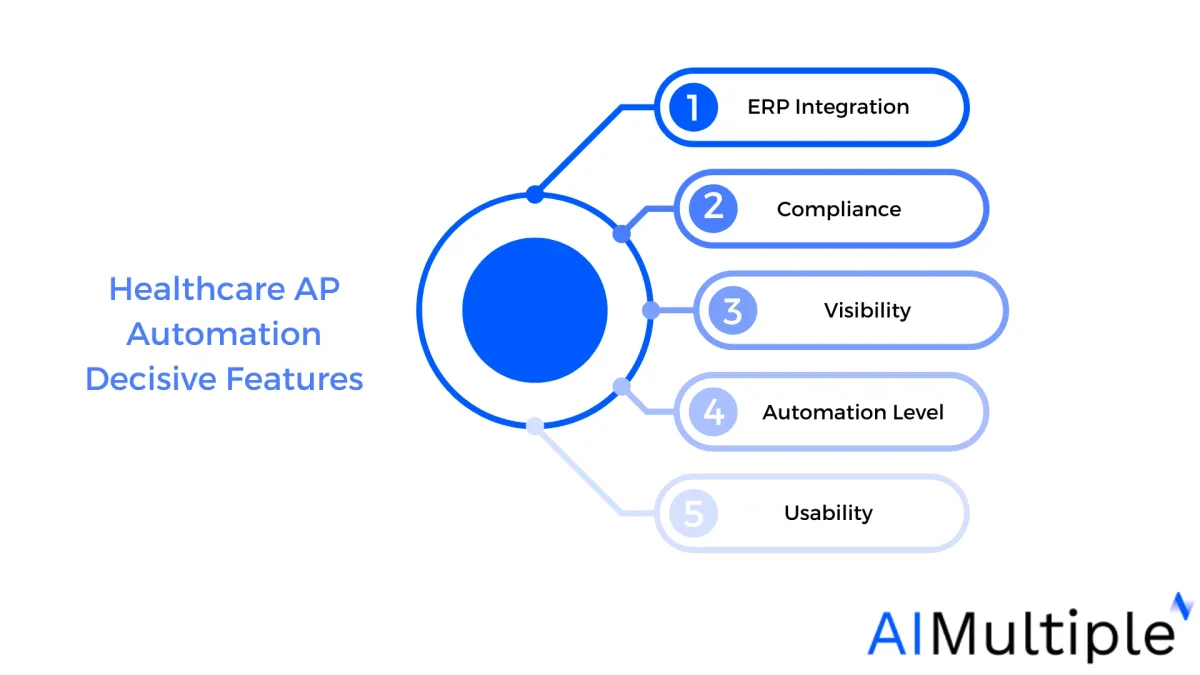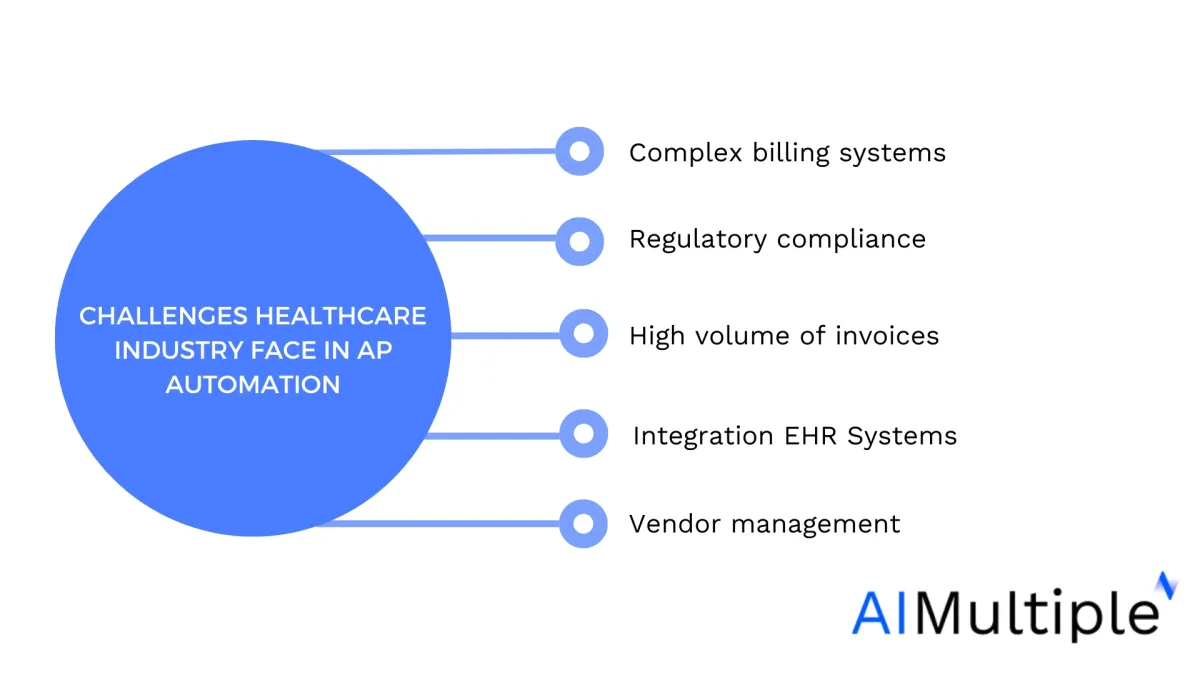By 2025, healthcare spending is expected to reach ~$5.34 trillion in the US.1 In a market where huge amounts of money are circulating, the financial management of healthcare organizations is crucial. One of the most important pillars of it is the accounts payable process.
Healthcare organizations need to handle complex tasks on a daily basis including finance. Automation is a must for a more efficient accounts payable system. To help you with this, the article will examine the tools and technologies that healthcare organizations can use to automate accounts payable, examples of these tools and the challenges the organizations can face.
5 Software for AP automation in healthcare
| Vendor | ERP Integration | Number of Reviews | Rating | Pricing |
|---|---|---|---|---|
| PairSoft | Oracle Netsuite Dynamics 365 Blackbaud Sage | 134 | 3.8 | Not publicly shared |
| Stampli | 70+ including Oracle Blackbaud Financial Edge Dynamics 365 Quickbooks | 1,326 | 4.5 | Not publicly shared |
| Tipalti | 10 including Sage Oracle Xero SAP ERPs | 460 | 4.5 | $149/month |
| NanoNets | Quicbooks Dynamics 365 Sage Xero | 76 | 4.8 | Starter: Pay as you go Pro: $999 Enterprise: Custom |
| Rillion | 15+ including Quickbooks Dynamics Oracle | 40 | 4.3 | Not publicly shared |
Table features:
- Healthcare organizations often use Enterprise Resource Planning (ERPs) for data & vendor management and workflow automation,such as SAGE, Blackbaud, Netsuite and Dynamics. This makes ERP integration an important factor for AP automation and is therefore included in the table.
- Apart from our sponsor PairSoft, the vendors are sorted out according to the number of reviews they get. The review numbers and ratings are extracted from major review websites such as Capterra, G2 and Trustradius
5 things to consider while choosing AP automation solutions in healthcare

1. Integration with ERP systems: Choosing a solution that integrates with an ERP system can enhance:
- data exchange and update. This will decrease the data entry errors.
- document management
2.Compliance: Solutions should guarantee HIPAA (Health Insurance Portability and Accountability Act) and HITECH compliance.
3.Visibility: The software should provide tools for real-time visibility into cash flow and financial metrics. Reporting and analytics features to monitor AP performance should also be considered.
4.Automation level: Ability to automate invoice processing and payment workflows are important. Also, 75% of customers in the healthcare industry want to pay medical bills online.2 Thus, the solutions should also provide support to electronic invoicing and secure payment processing.
5.Usability: The solution should have a user-friendly interface for accounts payable staff. Customization options to align with the specific requirements of health systems are also a plus.
5 challenges healthcare firms can face in accounts payable management

Complex billing systems
- Healthcare organizations can encounter complex billing systems due to the nature of medical services and insurance reimbursement.
- Medical coding, multiple payers (e.g., insurance companies, government programs), and varying payment terms & schedules can contribute to the situation.
- Each service rendered may have different codes. This makes reconciliation and the payment process challenging.
Regulatory compliance
Steps of healthcare accounts payable heavily relies on compliance with regulations, such as the Health Insurance Portability and Accountability Act (HIPAA). Thus, protecting patient data may create a burden for departments.
High volume of invoices
Healthcare organizations typically deal with a high volume of invoices that come from various sources, including suppliers, service providers, and internal departments. Managing and processing high volume manually can be overwhelming especially with the paper invoices as they require manual data entry and physical storage.
Integration with Electronic Health Records (EHR) Systems
Integrating AP processes with electronic health records (EHR) systems is essential for information flow and data consistency. Compatibility between AP automation tools and EHR systems can be technically challenging.
Lack of integration may lead to discrepancies between financial records and patient care data, impacting decision-making and compliance.
Vendor management
Healthcare organizations rely on a wide range of vendors for supplies, services, and equipment. Managing vendor relationships, negotiating contracts, and ensuring compliance with contractual terms are ongoing challenges for a typical healthcare organization.
Who can use AP automation in healthcare industry
Accounts payable in healthcare involves various use cases and many organizations:
Hospitals and health systems:
A large hospital or health system such as:
- an academic medical center
- community hospital
- Specialty hospitals can use AP automation to get rid of manual processes.
Clinics and outpatient centers:
- ambulatory surgery centers
- urgent care clinics
- specialty clinics can optimize their AP workflows through automation.
Long-term care facilities:
- nursing homes
- assisted living facilities
- and rehabilitation centers
Physician practices:
Solo practitioners and group practices can benefit from AP automation to handle invoices from suppliers.
Healthcare laboratories
- clinical laboratories
- diagnostic imaging centers
- research laboratories
Medical equipment suppliers:
Companies supplying medical equipment and supplies to healthcare providers are an important part of the healthcare business. The suppliers can use AP automation to manage billing and invoicing.
Healthcare IT Companies:
Healthcare IT solutions and software can enhance their accounts payable processes by automating invoice management and financial reporting.
Health insurance companies:
Health insurance companies and managed care organizations can use healthcare AP automation to handle invoices and payments.
Pharmaceutical and Biotech companies:
- pharmaceutical manufacturers
- biotechnology firms
- and distributors can automate AP processes to manage supplier payments and research grants.
Case study: Memorial Hospital
Healthcare organization: Memorial Hospital of Sweetwater County in southwest Wyoming with centers such as a cancer treatment is equipped with new technologies.
Challenge: Memorial Hospital faced challenges with a system causing frequent failures and limited access to budget details during purchases. This was leading to high error rates and workflow interruptions.
Requirements included an easy-to-use system for staff and improved budgeting efficiency to reduce errors.
Solution: PairSoft provided a requisition addressing these issues. They offered & delivered:
- budget reporting
- visibility throughout the purchasing process
- integration with NetSuite
- invoice extraction and document management tools
- digital documentation
After the implementation, Memorial Hospital has seen improvements, with reductions in requisition processing time.3
For more tools used in AP automation:
- Dynamics 365 in Accounts Payable Automation: In-Depth Review
- NetSuite Accounts Payable (AP) Automation
- Blackbaud Accounts Payable (AP) Automation: In-Depth Review
- Sage Accounts Payable (AP) Automation
- 7 Vic.AI Alternatives to Automate Accounting
- Top 10 ReadSoft Alternatives / Competitors
- Top 10 Kofax Alternatives/Competitors
- 14 Rossum AI Competitors/Alternatives
External links
External Links
- 1. The era of exponential improvement in healthcare? | McKinsey. McKinsey & Company
- 2. 2024 Trends in Healthcare Payments Annual Report | J.P. Morgan. J.P. Morgan
- 3. Memorial Hospital of Sweetwater County Reduces Costs with PairSoft | PairSoft. PairSoft


Comments
Your email address will not be published. All fields are required.